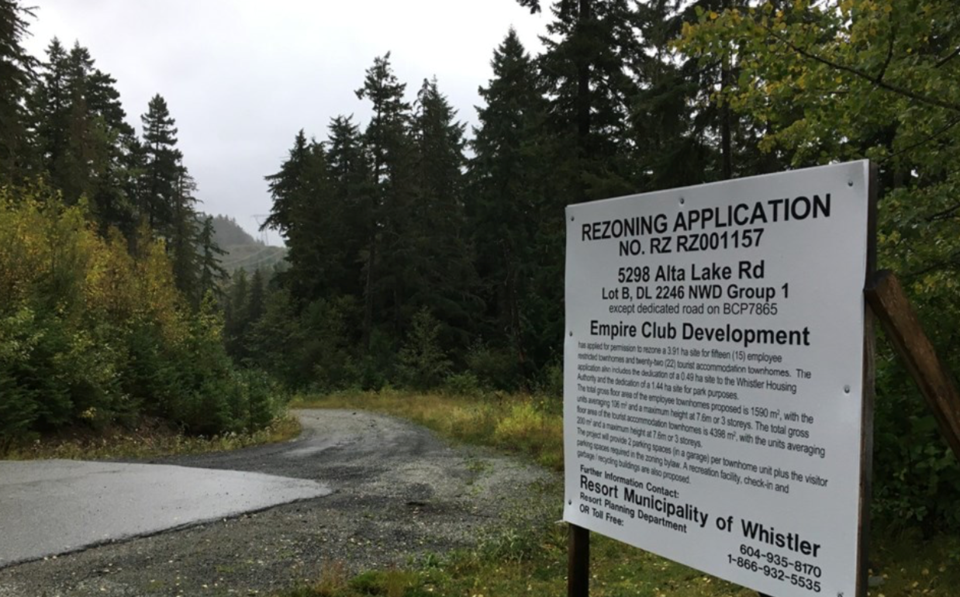Whistlerites had their last say this week on a divisive housing project proposed for the shores of Nita Lake before council considers third reading.
In a marathon public hearing streamed to more than 80 homes on Tuesday, March 9, the community weighed in on a mixed-use project proposed for 5298 Alta Lake Road that was first submitted in 2018 under the RMOW’s private developer guidelines for employee housing. The Empire Club Development Corp. proposal currently calls for 11 market tourist-accommodation units, 11 market residential units and 21 employee-restricted units on the lakefront site.
The project has so far garnered significant opposition, but Tuesday’s hearing appeared to be more evenly divided. And while critics’ concerns have varied, with issues raised over the project’s density, its potential impact on traffic as well as the ecologically sensitive site, support for the proposal tended to hone in on one component: Whistler’s dire need for affordable housing.
“At the end of the day, Whistler is a growing community and we need more housing,” explained Amanda Eggleton, who said the lease is coming up soon on her and her husband’s home. “We’re going to have to find a place that not only we can afford, but so we can continue our life and our careers here. Any projects that support the Whistler Housing Authority (WHA) in making our life here more stable and more comfortable, we’re all for it.”
If there is one thing that both supporters and detractors can agree on, it’s the need for more WHA housing, a point that was reiterated time and again during Tuesday’s meeting. But for many of the project’s critics, the potential benefit to the developer, former WHA board chair Michael Hutchison, does not match what the community is getting back in return.
“When I first heard of this application I was deeply, deeply offended as regarded to what the potential benefits for the community might be,” said former councillor and Freedom of the Municipality holder Garry Watson.
The project has gone through several iterations since first being presented under the RMOW’s guidelines for employee housing from private developers. A rezoning application for the site was first submitted in the spring of 2018, but was withdrawn before council could consider it, with a staff report noting the applicants determined one or more of the evaluation criteria “did not fit with their development goals for the property.” By March 2019, lawmakers had adopted new guidelines, removing the requirement that all proposals considered be 100-per-cent employee housing, and permitting limited amounts of unrestricted market housing to support a project’s economic viability.
When council got its first official look at the project in September 2019, it proposed 15 three-bedroom employee restricted townhomes and 22 three-bedroom market-tourism-accommodation townhomes, before it was revised to its current form in February of last year.
Watson and other critics of the project are calling for a more equitable tradeoff than the 4,202 square metres of market gross floor area for the 2,000 m2 of employee gross floor area proposed.
“That is basically my concern, that the profit potential in this project for this developer is his motivation, and that motivation is substantial,” Watson said.
“You’re being taken down the road for financial gain, and that needs to be examined and that needs to be fundamental to your assessment of the proposal. We can get more employee housing than has been proposed.”
The project’s supporters, meanwhile, reiterated that the community stands to gain a significant amount of employee housing—to the tune of 72 employee bed units, a 65-per-cent increase—in comparison to the existing zoning at the site, which allows for a hotel use and several cabins.
“The most fascinating thing … for me to watch about this proposal is public opposition is seemingly ignoring the as-of-right zoning for a hotel and cabins,” said Whistler native and chair of the Urban Development Institute Beau Jarvis.
“As a long-time resident of Whistler I would be disappointed if council turned this application down and what we’re left with is the existing zoning—because this application is clearly much better.”
Nita Lake Estates resident Bruce Green pointed out, however, that several of the amenities planned for the site, such as a Valley Trail extension, were already a condition of the existing zoning, while a dedicated park space and nature conservancy tied to the proposal were unlikely to have been built on anyway, he contended, as they were protected riparian areas.
“That’s really the bargain I submit the council should be looking at: is the municipality getting what it should in amenities for that great increase in density?” Green asked.
But Whistler can’t ignore its need for both market and employee housing, argued land-use design consultant Crosland Doak.
“Today there is a dwindling supply of housing stock for non-restricted, middle-income Whistlerites,” he said. “We’ve been focusing a lot on resident-restricted [housing], but I think we’re dangerously close to losing the middle ground in Whistler.”
Tuesday’s hearing marks the last legislative step before council considers third reading and then adoption of the proposed rezoning amendment for the site, which would also require an amendment to Whistler’s Official Community Plan.




